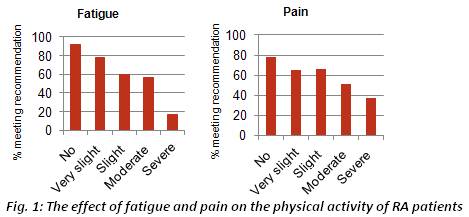Session Information
Session Type: Abstract Submissions (ARHP)
Background/Purpose: Growing body of research supports the benefit of physical activity in Rheumatoid Arthritis (RA) patients. Physical activity improves some of the most important RA patient outcomes: function, quality of life and pain, without any proven harmful effects on disease activity. However, little is known about physical activity levels among RA patients.
Objectives of this study were to determine how many RA patients meet the Dutch public health recommendation for physical activity, which is at least 30 minutes of moderate-intensity physical activities on at least 5 days a week, and to assess the main personal barriers of RA patients with regard to physical activity.
Methods: A questionnaire, consisted of three parts, was used to answer the objectives. The first part included several general questions describing the population. In this part also the fatigue and pain score of the patients was determined. The second part comprised the Short QUestionnaire to ASses Health-Enhancing Physical Activity (SQUASH) and the final part was the ‘guideline for sport participation’ (RSO).The aim of the RSO questionnaire was to assess the main motivation to exercise and the advices by health care providers concerning physical activity. Completing the questionnaire took about 15-20 minutes on www.bewegen-en-reuma.nl. Four different ways of promoting the hyperlink of the questionnaire were used trying to obtain a population which is representing the total RA population. To analyze the answers SPSS was used. One-sample t-tests were performed to compare the RA population with the general Dutch population.
Results: 141 patients completed the questionnaire. The proportions of RA patients meeting the physical activity recommendation were similar to those of the general population (Table 1). Fatigue and pain did have an impact on the achieving of the recommendation for physical activity in RA patients (Fig. 1). 59,1% of the RA population did not receive any advice with regard to physical activity by professional health care providers and 35,5% of the patients is not informed at all about options for physical activity.
Conclusion: No significant differences were seen between the RA population and the general population in achieving the recommendation for physical activity. RA patients are being informed and advised insufficiently with regard to physical activity. More stimulation and motivation by health care providers is needed to overcome exercise barriers and therefore to help patients in becoming or staying physically active.
|
Meeting recommendation for physical activity (%)
|
p-value
|
Minutes of activity/week RA population (n=141)
|
||
|
RA population (n=141)
|
General population (n=2295)
|
|||
|
Total
|
58,9
|
59,3
|
0,917
|
1578
|
|
Female
|
55,7
|
59,7
|
0,386
|
1590
|
|
Male
|
73,1
|
58,3
|
0,108
|
1528
|
|
Age
|
|
|||
|
<65 |
61,1
|
1603
|
||
|
>=65
|
56,3
|
48,4
|
0,385
|
1325
|
|
BMI
|
|
|||
|
<25 |
58,5
|
59,1
|
0,963
|
1582
|
|
25-30
|
71,7
|
56,2
|
0,034
|
1761
|
|
>30
|
39,3
|
50,6
|
0,239
|
1277
|
|
Disease activity
|
|
|||
|
Light
|
86,7
|
1793
|
||
|
Moderate
|
58,9
|
1625
|
||
|
Severe
|
36,8
|
1149
|
||
|
Disease duration (yr)
|
|
|||
|
=<5 |
62,1
|
2215
|
||
|
5-16
|
53,3
|
1608
|
||
|
16-26
|
63,2
|
1346
|
||
|
>25
|
58,6
|
1200
|
||
|
Work
|
|
|||
|
No
|
58,6
|
58,5
|
0,986
|
1270
|
|
Yes
|
59,5
|
64,7
|
0,503
|
2304
|
Table 1:Meeting recommendation for physical activity
Disclosure:
J. van Kuijk,
None;
S. van Dartel,
None;
H. Repping-Wuts,
None.
« Back to 2013 ACR/ARHP Annual Meeting
ACR Meeting Abstracts - https://acrabstracts.org/abstract/physical-activity-and-rheumatoid-arthritis-state-of-the-art/

